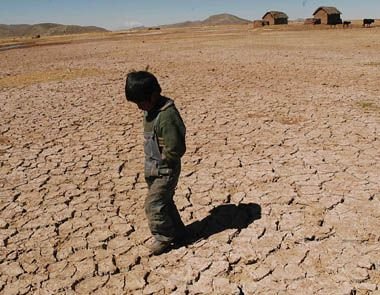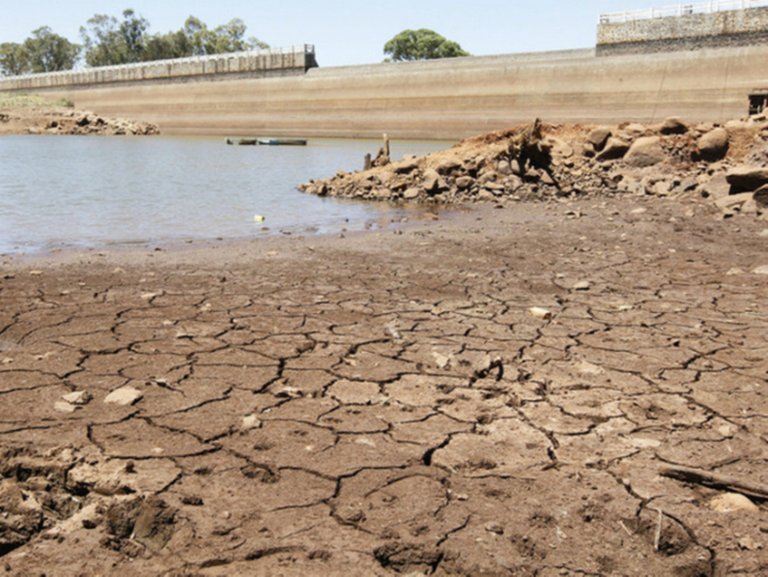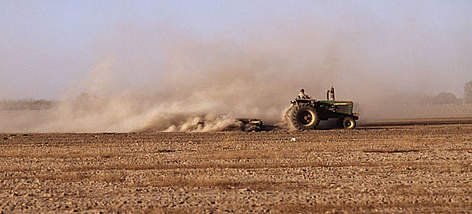Erosion, a possible threat to Earth?
Agriculture is defined as the activity that man exercises to obtain food through the use of land and solar energy, which represents a strategic activity for society. At present, many countries have modernized and developed this activity to achieve high efficiency in the production of food and fibers. This modernization has generated that the activity of agriculture has significant impacts on the ecosystem when there is no correct application of methods for the use of phytosanitary products, application of fertilizers, waste management, etc.

These impacts may vary depending on how aggressive the agriculture is. Some of them are:
- Decrease in soil production
- Accumulation of pollutants
- Lack of water
- Emergence of resistance to pesticides in pests
- Loss of pollinating species and wild habitats.
- Reduction of genetic diversity by crop uniformity
- Potential health risks related to the appearance of waste, sometimes toxic in food.

According to the Food and Agriculture Organization of the United Nations, 33% of the world's soil suffers erosion, depletion of nutrients or pollution due to the excessive use of agrochemicals.
Until 100 years ago, agriculture was practiced in a natural way, with techniques and practices that were maintained for centuries, but with the evolution of agriculture in the twentieth century, these natural techniques were changing which managed to increase the production of foods.
One of these innovations was the use of the first chemical fertilizers during the 1940s, dramatically increasing food production as the plants responded intensively to the chemical stimulus. However, the systematic use of chemicals with the consequent increase in production has meant that today to produce the same amount it has been necessary to increase the dose of fertilizer from 20 units to 240 units.
But the application of fertilizer not only increased the production of food but also the production of weeds so the herbicides began to be applied. Then began to manufacture the different types of phytosanitary needed to combat the attack of fungi and insects.
In antiquity, it was not necessary to fight insects because their natural enemies were in charge of that work. However, when going from an extensive to an intensive agriculture, the natural enemies lost the control capacity of the microsystem, which means that the pests attack the crops. Thanks to the phytosanitary products, it was possible to control and protect the crops. These phytosanitary products were well received at the beginning but were later determined to generate large side effects. Among the effects are:
- Useful pests or insects are annihilated indiscriminately
- Resistance was created in pests to the chemicals used
- Soils and rivers were contaminated
- The disappearance of the flora and fauna was propitiated
- We found levels of chemical pollution and salinization worrisome.
Nowadays, agriculture, industry and tourism are destroying natural habitats, and along with it the wild species. Many wetlands, dunes, steppes and fluvial ecosystems have been lost through residential areas, motorways, farms, etc.
The biological diversity of the agrarian ecosystems is lower than the natural ecosystems; however there is a symbiosis between them. The cultivated areas export nitrates, phosphates, chemicals and organic material and the organisms that live in the natural areas feed and take refuge in the crops.
Soil is the main resource for agricultural exploitation but its regeneration is slow, the soil is sometimes considered as a non-renewable resource and increasingly scarce since it is exposed to continuous processes of degradation and destruction. That is why the soil must maintain its conditions of porosity, composition, presence of microorganisms and organic matter so that it can fulfill its function as a protective medium for organisms.
The main processes of soil degradation are erosion, acidification, soil compaction, loss of organic matter, salinization and waterlogging.
"At present 36 hectares of soil per minute are lost in the world, in Chile half of the country is eroded, the desert advances towards the south at an approximate rate of 3 kilometers per year, and what is happening is that the 50 percent of the Chilean territory produces nothing and could be producing. " says forest engineer Pablo García-Chevesich
Erosion is the main environmental problem due to indiscriminate production.
Erosion is understood to be the removal of surface material by physical action or wind. This is a process that takes place naturally, but when the man generates it by inadequately using the natural resources, the effects are seen in an accelerated way. Erosion is becoming a serious problem that has been increased by not taking the necessary measures to alleviate it. It is estimated that between 5 and 10 hectares per year are lost only in Europe while 1 hectare is recovered naturally. This relationship is disproportionate; the serious drawback is that in 16% of cases erosion damage is irreversible. As recommendations to avoid erosion are:
- Agri-environmental measures to combat this problem and prevent its advance
- Fight against fire
- Restore degraded spaces
Among the effects of Erosion is the loss of soil fertility. Soil fertility is the soil capacity to supply to the plant with all the elements it needs, in the quantity and in the way it is needed. This loss of fertility can be compensated by the application of chemical fertilizers, since they can provide nitrogen, phosphorus, potassium and other nutrients. However they do not provide the necessary microorganisms to maintain the healthiness of the soil. Therefore, it is essential that the proper biodiversity of these organisms exists for the proper development of crops.

According to data from the National Autonomous University of Mexico (UNAM), more than 45% of the soil of Mexico is deteriorated by erosion or chemical degradation. "Mexico has 200 million hectares of land and only 22 million are cultivable.
Professor Cruz Flores of UNAM points out that "The fertile layer of soils is formed over time, for a centimeter of soil to be formed, more than 200 years are required and for a soil to be productive they are needed at least 20 centimeters of soil thickness, that is, it takes 4,000 years or more to have a productive soil."
According to these data, in 22 years or less, the 22 million hectares of cultivable land could be lost.
These negative aspects are forcing developed countries to change the traditional image of the farmer to an environmental manager.
But not all is bad news, according to FAO. The world's soils are deteriorating due to erosion, but this tendency can be reversed as long as countries begin to apply sustainable management practices and the use of appropriate technologies.

The report “The state of soil resources in the world” done by FAO and published on December 4, 2015, brings together the work of some 200 soil scientists from 60 countries whose objective is to raise global awareness in this matter. Ban Ki-moon Secretary General of the UN said:
"We promote sustainable land management based on adequate governance and rational investments; together we can promote the cause of soils, which constitute a true solid foundation for life".
Soils are of vital importance for humanity because they are not only needed for the production of nutritious crops but also filter and clean tens of thousands of km3 of water each year. Soils also act as a carbon store, which means they can help regulate carbon dioxide emissions and other greenhouse gases.

The conclusion of the report is that most of the soils worldwide are in bad or very bad condition and that in most of the time more soils are getting worse than those that are improving and that 33% of the soils are moderate to highly degraded. The Director General of FAO, José Graziano da Silva pointed out that:
"New losses of productive soils would severely damage food production and food security, increasing the volatility of the food price, and potentially plunging millions of people into hunger and poverty, but the report also offers evidence that this loss of resources and soil functions can be avoided. "
It is the responsibility of everyone to apply correct techniques to manage the environment otherwise we could be in the presence of a true global catastrophe due to the irresponsibility of human beings. Hopefully for our descendants things change.
Thanks to @sirknight for the #celestialchallenge.
• Sunday - Light
• Monday - Darkness
• Tuesday - Animal Kingdom
• Wednesday - Structures
• Thursday - Forces in Nature
• Friday - LoveBeauty Freedom
• Saturday - Agriculture
Source
http://www.fao.org/news/story/es/item/357165/icode/
http://www.fao.org/soils-2015/es/
http://problemasambientales-laerosion.blogspot.com/2010/11/noticias-sobre-la-erosion-en-el-mundo.html
https://sustainabledevelopment.un.org/?menu=1300
http://www.fao.org/3/a-i5126s.pdf
http://wwf.panda.org/what_we_do/footprint/agriculture/impacts/soil_erosion/
Hey man! Really good article. We've had a lot of damage around here over the last decade or so; it becomes really noticeable when driving alone the rivers; it's bad. Really well written article. Cheers!
thanks @herbertholmes really appreciated.. cheers Bro!!
You got a 10.28% upvote from @ipromote courtesy of @marglys!
If you believe this post is spam or abuse, please report it to our Discord #abuse channel.
If you want to support our Curation Digest or our Spam & Abuse prevention efforts, please vote @themarkymark as witness.
Congratulations @kkroto80! You have completed some achievement on Steemit and have been rewarded with new badge(s) :
Click on any badge to view your own Board of Honor on SteemitBoard.
For more information about SteemitBoard, click here
If you no longer want to receive notifications, reply to this comment with the word
STOP